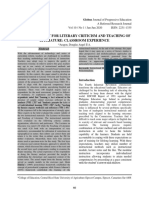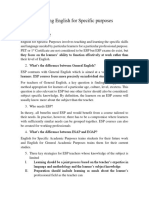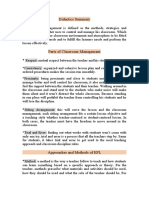Language, Culture and Society
Language, Culture and Society
Uploaded by
Aroma MangaoangCopyright:
Available Formats
Language, Culture and Society
Language, Culture and Society
Uploaded by
Aroma MangaoangOriginal Description:
Copyright
Available Formats
Share this document
Did you find this document useful?
Is this content inappropriate?
Copyright:
Available Formats
Language, Culture and Society
Language, Culture and Society
Uploaded by
Aroma MangaoangCopyright:
Available Formats
Language Culture and Society
Define these terms:
1. Language – Language is an instrument used by humans to express their needs and
deepest longings. Language serves as a bridge of communication, May it be spoken, non-
verbal, or in a written way of communication.
2. Culture- portrays general customs and beliefs of a particular race or tribe. It purposefully
highlights people's values about their unique traditions, especially in their language,
cuisine, social habits, and music.
3. Society- A society is a group of people who harmoniously
live together, sharing the same interest and passion to fulfill their common good.
4. Monolingual- is a person who speaks only one language.
5. Monodialectical- pertains to the usage of a single dialect.
6. Phonetic- is the study of speech sounds.
7. Primitive- Primitive- refers to how people lived their lives in the earliest time of
development before technology has far begun or can also be associated with the words
‘strange’ or “unusual.”
8. Dialect- a type of language that is spoken by a particular region or group of people.
9. Fluent- refers to the ability to express oneself articulately in spoken or written.
Answer these questions:
1. What are considered as “primitive languages”? Why are they thought to be primitive?
Based on the reading material, unwritten language is what other people perceived as
primitive. The reason behind this myth is that people approach it from an ethnocentric
perspective, addressing another language as ugly if it produces an indifferent sound or when
pronounced strange from how other people speak it.
2. What is grammar?
Grammar is a system of rules governing the conventional arrangement and
relationship of words in a sentence, it is the way words are put together to make correct
sentences.
3. If a language has complex grammatical system, then it is classified as “civilized”
language. On the other hand, languages that have little grammar are considered
ineffective.
There is no truth in this statement, according to what I have read the degree of
grammar complexity is not a measure of how effective a particular language is. Dell
Hymes, a linguistic anthropologist, said that these languages which appear to be civilized
and more successful than others are effective not because they are structurally more
advanced but because they happen to be associated with societies in which language is
the basis of literature, education, and commerce. He also said that no known language are
primitive and all have achieve the middle status.
4. What is vocabulary?
is more than a list of words we must memorize but understand in order for us to
communicate effectively, it has a great impact and the main factor to improve the
person’s ability, to listen, speak, read and write.
5. If Language A has 250 verbs and Language B has only 50 verbs, then Language B is a
primitive language
Language plays a role in the identity of a culture. Language has been a part of
human living, a means of communication. It has evolved through time and is continuing
to change in the present. No one can scientifically convey how language had started but
only can assume its existence. Language presents itself to us in simple ways yet still
mysterious on the human mind, like a baby who naturally adapts and speaks the words
that he hears in his environment.
Our different backgrounds or culture can be the underlying reason why a
particular language functions differently from another. These are some facts that could
lead us to what Dell Hymes had concluded in his linguistic findings, "Language are not
functionally equivalent, because the role of the speech varies from one society." Simple
human language with limited vocabulary and grammar do not exist, for all language are
equally equipped to serve the society who speak it.
6. What is a dialect?
It is a type of language that is spoken by a particular region or group of people.
7. What is an accent?
The way in which people in a particular area, country, or social group pronounce words.
8. What is linguistic prejudice?
it pertains to either discrimination and judgment of a person’s worth based on the
use of language and characteristics of speech, including first language, accent, size of
vocabulary (whether the speaker uses complex and varied words), modality, and syntax.
9. What is anthropology?
The systematic study of humanity, with the goal of understanding our
evolutionary origins, our distinctiveness as a species, and the great diversity in our forms
of social existence across the world and through time
10. What is linguistic anthropology?
A branch of anthropology that studies the role of language in the social lives of
individuals and communities.
You might also like
- © Pearson 2020 Photocopiable Focus 3 Second EditionDocument2 pages© Pearson 2020 Photocopiable Focus 3 Second EditionSalvador Dali80% (5)
- English For Specific PurposesDocument124 pagesEnglish For Specific PurposesJubel Jetro PontuyaNo ratings yet
- THE ROLE OF THE NATIVE LANGUAGE PPT SLADocument9 pagesTHE ROLE OF THE NATIVE LANGUAGE PPT SLAKristiani Simorangkir50% (2)
- Week 2-Intro To Language Culture and AnthroDocument40 pagesWeek 2-Intro To Language Culture and AnthroAung Thuta NyanNo ratings yet
- Learning ModuleDocument14 pagesLearning ModuleJannet Calma Lansangan50% (2)
- Needs Analysis Final Assignment Siti ZahrahDocument16 pagesNeeds Analysis Final Assignment Siti ZahrahSiti zahrahNo ratings yet
- Tranforming Simple Paragraph Into ComplexDocument6 pagesTranforming Simple Paragraph Into ComplexTheophras academyNo ratings yet
- Mythology and Folklore Sample SyllabusDocument19 pagesMythology and Folklore Sample SyllabusLarah BautistaNo ratings yet
- Language Culture and SocietyDocument5 pagesLanguage Culture and SocietyZamZamie33% (3)
- Language, Culture and SocietyDocument9 pagesLanguage, Culture and SocietyMichelle BautistaNo ratings yet
- Unit 1 What Is LanguageDocument36 pagesUnit 1 What Is Language'ปราย ปันสุขNo ratings yet
- Eighth Semester Msc. Alejandra Flores H.: EnglishDocument63 pagesEighth Semester Msc. Alejandra Flores H.: EnglishSaúlNo ratings yet
- Characteristics of Nonfiction TextDocument2 pagesCharacteristics of Nonfiction Textapi-295092435100% (1)
- Midterm ExamDocument3 pagesMidterm ExamalohaNo ratings yet
- EL 107 Reviewer (1st Unit Test)Document21 pagesEL 107 Reviewer (1st Unit Test)Princess AngelNo ratings yet
- 1 - What Is LanguageDocument3 pages1 - What Is Languagecosme.fulanitaNo ratings yet
- LING2 Group 1 Prelim Lesson 2 and 3 ReportDocument15 pagesLING2 Group 1 Prelim Lesson 2 and 3 ReportJoel Maghanoy100% (1)
- Final Exam in Survey in American English Literature.Document2 pagesFinal Exam in Survey in American English Literature.JOHNMAR TACUGUENo ratings yet
- Exam Midterm STRUCTURE OF ENGLISH LANGUAGEDocument1 pageExam Midterm STRUCTURE OF ENGLISH LANGUAGEMaureen Taguba Sta Ana100% (1)
- Literary Criticism in The PhilippinesDocument9 pagesLiterary Criticism in The PhilippinesMaria Cristina C. MolinaNo ratings yet
- Prefinal in Intro To LinguisticsDocument4 pagesPrefinal in Intro To LinguisticsRoessi Mae Abude AratNo ratings yet
- Language, Culture and SocietyDocument6 pagesLanguage, Culture and SocietyDorepeNo ratings yet
- Pidgins and CreoleDocument15 pagesPidgins and CreoleRizky Eka PrasetyaNo ratings yet
- English For Specific PurposesDocument39 pagesEnglish For Specific PurposesGold P. TabuadaNo ratings yet
- Language, Culture and SocietyDocument6 pagesLanguage, Culture and SocietyJee En Bee100% (1)
- FINAL Exam Teaching and Assessment of GrammarDocument2 pagesFINAL Exam Teaching and Assessment of GrammarReñer Aquino BystanderNo ratings yet
- Challrnges in Implementing Language Policies in The PhilippinesDocument6 pagesChallrnges in Implementing Language Policies in The PhilippinesChristine P. LonoyNo ratings yet
- 4-ESP Handout 1st Semester - 1Document16 pages4-ESP Handout 1st Semester - 1intan melatiNo ratings yet
- Figures of SpeechDocument3 pagesFigures of SpeechJulie Anne BunaoNo ratings yet
- SEE 5, Structure of EnglishDocument32 pagesSEE 5, Structure of Englisherica lusongNo ratings yet
- Teaching English For Specific PurposesDocument6 pagesTeaching English For Specific PurposesMartina CantosNo ratings yet
- IM-Language Programs and Policies of Multilingual Societies-CalvarioDocument36 pagesIM-Language Programs and Policies of Multilingual Societies-CalvarioZay CaratihanNo ratings yet
- Stylistics and Discourse Analysis Module 6Document15 pagesStylistics and Discourse Analysis Module 6Joshua D. ALARBANo ratings yet
- Teaching and Assessment of Grammar Midterm CoverageDocument4 pagesTeaching and Assessment of Grammar Midterm CoverageRoselyn AlbisoNo ratings yet
- Language Acquisition Myths & RealitiesDocument53 pagesLanguage Acquisition Myths & Realitiessherali ghulam hussainNo ratings yet
- Language Culture and Society Course IntroDocument25 pagesLanguage Culture and Society Course IntroHatamosa Hyacinth100% (1)
- Language Culture and SocietyDocument1 pageLanguage Culture and SocietySandy Medyo GwapzNo ratings yet
- Introduction To Linguistics MODULE 1Document10 pagesIntroduction To Linguistics MODULE 1Anne Kimberly TolaNo ratings yet
- Esp 1Document13 pagesEsp 1Jan Dave OlacoNo ratings yet
- Ndc-Tagum Foundation Inc.: Republic of The PhilippinesDocument7 pagesNdc-Tagum Foundation Inc.: Republic of The PhilippinesRona Jane SanchezNo ratings yet
- Syllabus Introduction To Linguistics PDFDocument4 pagesSyllabus Introduction To Linguistics PDFAria SupendiNo ratings yet
- Teaching and Assessment of Literature StudiesDocument5 pagesTeaching and Assessment of Literature Studiesname lessNo ratings yet
- Business Communication Course Syllabus 2019-2020Document5 pagesBusiness Communication Course Syllabus 2019-2020api-479075415No ratings yet
- Teaching and Assessment of GrammarDocument10 pagesTeaching and Assessment of GrammarApple MoncayoNo ratings yet
- EXERCISES OF UNIT 2 - SociolinguisticDocument1 pageEXERCISES OF UNIT 2 - SociolinguisticTuan NguyenNo ratings yet
- Elt 103 Principles and Theories Course 2Document8 pagesElt 103 Principles and Theories Course 2JETT MAGDOBOYNo ratings yet
- Philippine Languages and Dialects: By: Kriezel Anne Siva 3 Year BA-EnglishDocument35 pagesPhilippine Languages and Dialects: By: Kriezel Anne Siva 3 Year BA-EnglishKriezel Anne SivaNo ratings yet
- Language in Society - Syllabus 2016 PDFDocument6 pagesLanguage in Society - Syllabus 2016 PDFRyan Lala Rangga SenjayaNo ratings yet
- Brain and LanguageDocument4 pagesBrain and LanguageAlNo ratings yet
- MR E. ReviewerDocument141 pagesMR E. Revieweralimmarissa46No ratings yet
- EES 1 ListeningDocument4 pagesEES 1 ListeningShubham PatilNo ratings yet
- S1, Didactics SummaryDocument13 pagesS1, Didactics SummaryRayene MedabisNo ratings yet
- Task 2 - The Nature of Linguistics and LanguageDocument13 pagesTask 2 - The Nature of Linguistics and LanguageViviana FlorezNo ratings yet
- Course OutlineDocument2 pagesCourse OutlinerabiaNo ratings yet
- Materials For Developing Reading SkillsDocument5 pagesMaterials For Developing Reading SkillsHeaven's Angel LaparaNo ratings yet
- Mythology and FolkloreDocument3 pagesMythology and FolkloreCristine AspirinNo ratings yet
- Materials Development ELTDocument77 pagesMaterials Development ELTBekir OkalperNo ratings yet
- Summarize: Common Method of Teaching English For Specific PurposeDocument12 pagesSummarize: Common Method of Teaching English For Specific Purposeanna marthinneNo ratings yet
- Regional and Social Dialectology PresentationDocument22 pagesRegional and Social Dialectology PresentationMa. Elarnie L. Modesto100% (1)
- Food-Where Does It Come From PPT Part 1Document22 pagesFood-Where Does It Come From PPT Part 1charliecharliestoryNo ratings yet
- 200 Years of Grammar: A History of Grammar Teaching in Canada, New Zealand, and Australia, 1800–2000From Everand200 Years of Grammar: A History of Grammar Teaching in Canada, New Zealand, and Australia, 1800–2000No ratings yet
- Century Philippines As Rizal'S Context: Economic DevelopmentDocument4 pagesCentury Philippines As Rizal'S Context: Economic DevelopmentMixx MineNo ratings yet
- Language Policies, Attitudes, and BeliefsDocument25 pagesLanguage Policies, Attitudes, and BeliefsOscar MambetalievNo ratings yet
- ENG Pg-14.Exe - TxoboyDocument2 pagesENG Pg-14.Exe - Txoboysyntiacomissal836No ratings yet
- Hastings, Battle Of: Middle English LiteratureDocument2 pagesHastings, Battle Of: Middle English LiteraturexxxxNo ratings yet
- Font Style For Research PaperDocument4 pagesFont Style For Research Paperistdijaod100% (1)
- 2 - Learning Activity OneDocument10 pages2 - Learning Activity OneMendoza MariaNo ratings yet
- Before The ConquestDocument25 pagesBefore The Conquestassez natNo ratings yet
- Navigating Through Mathematics 1st Edition Collins Nunley Test BankDocument22 pagesNavigating Through Mathematics 1st Edition Collins Nunley Test Bankwilliam100% (39)
- So, Such, Too, EnoughDocument22 pagesSo, Such, Too, Enoughcreatura d0% (1)
- WB GC1 Unit 8Document5 pagesWB GC1 Unit 8phuong100% (1)
- Poetry AnthologyDocument3 pagesPoetry AnthologyAmy Wilbourne0% (1)
- Phonology Assignment and Lesson PlanDocument45 pagesPhonology Assignment and Lesson PlanGeroNimoNo ratings yet
- Exercises:Exam QuestionsDocument4 pagesExercises:Exam QuestionsMarouane ElbaidaNo ratings yet
- English ReviewerDocument12 pagesEnglish RevieweritlogNo ratings yet
- Verb Tenses. Revision PDFDocument2 pagesVerb Tenses. Revision PDFaroitisNo ratings yet
- CS PDFDocument129 pagesCS PDFNgoc Quy TranNo ratings yet
- B1 PresentationDocument37 pagesB1 PresentationCira Fernandez SanchezNo ratings yet
- References: Cara Baru Menulis Dengan Metode Kolaborasi. Bandung: PT KiblatDocument10 pagesReferences: Cara Baru Menulis Dengan Metode Kolaborasi. Bandung: PT KiblatMansur SipinatheNo ratings yet
- Gimel 2Document9 pagesGimel 2Frater MagusNo ratings yet
- Berlitz Italian Complete Rush Hour PDFDocument184 pagesBerlitz Italian Complete Rush Hour PDFnwytg100% (2)
- JMET 2006 Original PaperDocument68 pagesJMET 2006 Original PaperBrian WilliamsNo ratings yet
- Presentation SociolinguisticsDocument17 pagesPresentation Sociolinguisticsmehdi67% (3)
- Iregular Verbs List: Pasado Participio SignificadoDocument8 pagesIregular Verbs List: Pasado Participio SignificadoCristian GaldámezNo ratings yet
- Mckinnon Resume 2018Document2 pagesMckinnon Resume 2018api-214581758No ratings yet
- The Analysis of Steve Jobs's SpeechDocument5 pagesThe Analysis of Steve Jobs's SpeechDuţă Ovidiu Ionel100% (4)
- CL11 - MidTerm Exam - Writing TaskDocument2 pagesCL11 - MidTerm Exam - Writing TaskAlejandra HuaytaNo ratings yet
- Bayley Paul Analysing Language and Politics PDFDocument9 pagesBayley Paul Analysing Language and Politics PDFGeany NaNo ratings yet
- Schulz and World LiteratureDocument24 pagesSchulz and World LiteratureVikram Teva RajNo ratings yet
- Computer Modeling ApplicationsDocument930 pagesComputer Modeling Applicationsggonzal26No ratings yet

























































































